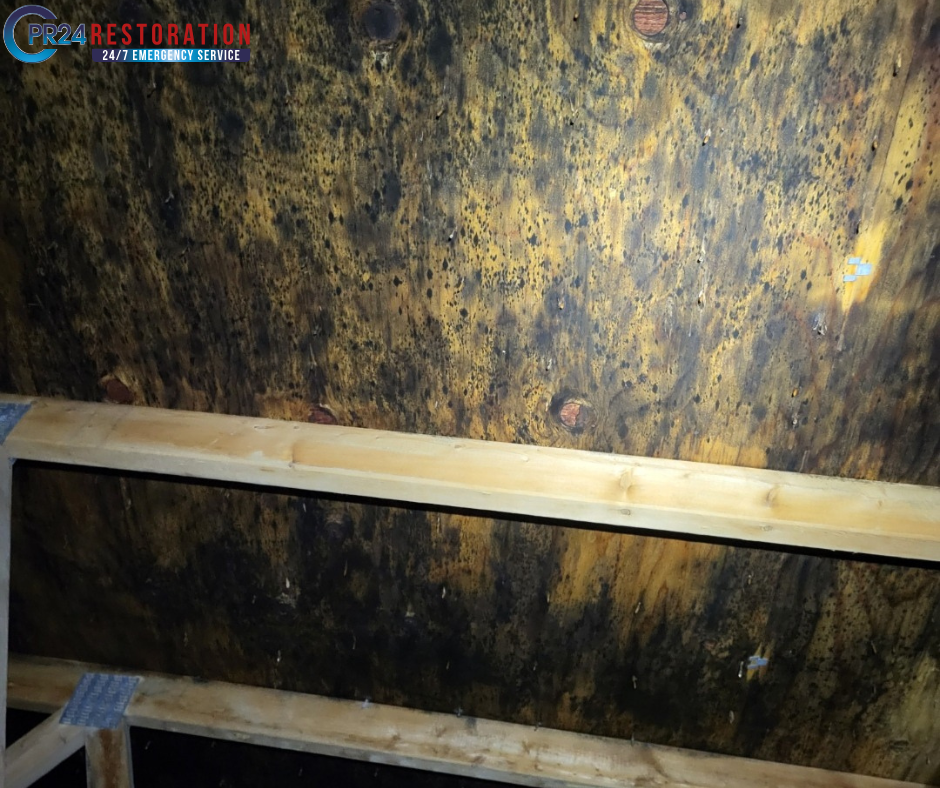Mold is a common yet often overlooked issue that can significantly impact health and well-being. If you’re in the GTA, you should be aware of the 10 Warning Signs of Mold Toxicity Toronto. This fungus thrives in damp, poorly ventilated areas, making homes, workplaces, and schools prime locations for its growth.
Mold is a natural part of the environment. However, some types can make harmful toxins called mycotoxins. These toxins can cause various health problems.
Understanding the warning signs of mold toxicity is crucial for early detection and intervention. Below, we explore ten key symptoms that may indicate mold exposure and toxicity.
Understanding Mold Toxicity Toronto
10 Warning Signs of Mold Toxicity Toronto symptoms happen when people breathe in mold spores or mycotoxins. This can cause many health problems. The severity of symptoms can vary a lot from person to person. This depends on factors like sensitivity, exposure time, and overall health.
Toxic symptoms from mold may include respiratory problems, skin irritation, fatigue, and neurological issues. Black mold symptoms, especially from Stachybotrys chartarum, can be extremely serious. They may cause long-lasting coughing, eye irritation, and even memory issues.
Toxic mold exposure signs are often missed. They can include headaches, sinus congestion, and a weak immune system.
Knowing that toxic mold symptoms may not appear right away is important. Exposure can make them worse over time.
Mold comes in different types, such as allergenic, toxigenic, and pathogenic molds. Each type has different risks for human health.
The Role of Mycotoxins Toronto
Mycotoxins are toxic compounds produced by certain types of mold. When inhaled or ingested, these substances can cause serious health issues by triggering inflammatory responses in the body. Mold toxicity symptoms vary but may include respiratory issues, fatigue, and cognitive difficulties.
If you’re wondering how to know if mold is making you sick, pay close attention to persistent symptoms that don’t improve with time. Mold often grows in damp and poorly ventilated areas. This includes basements, bathrooms, and kitchens. It can thrive on water-damaged materials like drywall, carpets, and insulation.
Health effects of mold can be especially severe for individuals with allergies or weakened immune systems. Research shows that mycotoxin exposure symptoms may include brain fog, digestive issues, or even mood disturbances. If you are wondering, “Can mold make you sick?” the answer is yes. Finding and removing mold quickly is important to protect your health.
Vulnerable Populations Toronto
Certain groups are more susceptible to mold toxicity, including individuals with weakened immune systems, respiratory conditions, or allergies. Children and older adults are at higher risk. Watching for signs of mold exposure in these groups is important.
1. Respiratory Issues
One of the most common signs of mold toxicity is respiratory distress. Individuals may experience symptoms such as:
- Shortness of Breath: Difficulty breathing can occur, especially during physical activity or exertion.
- Wheezing: A whistling sound when breathing may indicate airway constriction because of mold exposure.
- Persistent Cough: A chronic cough that does not improve may signal irritation in the respiratory tract.
Understanding Respiratory Symptoms Toronto
Mold spores can irritate the lining of the respiratory system, leading to inflammation and increased mucus production. This can exacerbate existing conditions like asthma or allergies, making it crucial to address mold issues promptly.
2. Allergic Reactions
Mold exposure can trigger allergic reactions in sensitive individuals. Common allergic symptoms include:
- Sneezing and Nasal Congestion: Frequent sneezing and a runny or stuffy nose may indicate an allergic response to mold.
- Itchy or Watery Eyes: Allergic conjunctivitis can occur, causing discomfort and redness in the eyes.
- Skin Rashes: Direct contact with mold can lead to skin irritation, including rashes or hives.
The Importance of Allergy Testing
If you suspect mold is causing allergic reactions, consider consulting an allergist for testing. Identifying specific mold allergies can help guide treatment and remediation efforts.
3. Cognitive Difficulties
10 Warning Signs of Mold Toxicity Toronto can also affect cognitive function, leading to symptoms such as:
- Brain Fog: Individuals may experience difficulty concentrating, forgetfulness, or mental confusion.
- Memory Loss: Short-term memory issues can arise, making it challenging to recall recent events or information.
- Mood changes such as anxiety, depression, or irritability can link to mold exposure.
The Neurological Impact of Mold Toronto
Research suggests that mycotoxins can interfere with neurotransmitter function, leading to cognitive impairments. Addressing mold exposure is essential for restoring mental clarity and emotional well-being.
4. Fatigue and Weakness
Chronic fatigue is another common symptom associated with mold toxicity. Individuals may feel:
- Unexplained Tiredness: Persistent fatigue that does not improve with rest can be a sign of mold exposure.
- Muscle Weakness: Generalized weakness may occur, making daily activities more challenging.
- Lack of Energy: A noticeable decrease in energy levels can impact productivity and quality of life.
Understanding Fatigue
Fatigue related to mold toxicity may stem from the body’s immune response to mycotoxins. The energy required to combat inflammation can leave individuals feeling drained and exhausted.
5. Digestive Issues
Mold exposure can also lead to gastrointestinal symptoms, including:
- Nausea: Individuals may experience feelings of queasiness or discomfort in the stomach.
- Diarrhea: Frequent loose stools can occur, indicating digestive distress.
- Loss of Appetite: A decreased desire to eat may result from nausea or gastrointestinal discomfort.
The Gut-Mold Connection
The gut microbiome plays a crucial role in overall health, and mold exposure can disrupt this balance. Addressing mold toxicity may help restore digestive health and improve symptoms.
6. Skin Irritations
Skin reactions are common among individuals exposed to mold. Symptoms may include:
- Rashes: Red, itchy patches on the skin can indicate an allergic reaction to mold.
- Hives: Raised welts may develop, often accompanied by itching and discomfort.
- Eczema Flare-Ups: Individuals with pre-existing skin conditions may experience worsening symptoms because of mold exposure.
Managing Skin Reactions
If you notice skin irritations that coincide with mold exposure, consider consulting a dermatologist for evaluation and treatment options.
7. Headaches and Migraines
Frequent headaches or migraines can be linked to mold toxicity. Symptoms may include:
- Chronic Headaches: Persistent headaches that do not respond to typical treatments may indicate mold exposure.
- Migraines: Individuals may experience severe headaches accompanied by nausea and sensitivity to light.
- Tension Headaches: Stress and tension related to mold exposure can contribute to headache symptoms.
The Link Between Mold and Headaches
Mold spores can release volatile organic compounds (VOCs) that may trigger headaches in sensitive individuals. Identifying and addressing mold sources can help alleviate these symptoms.
8. Joint and Muscle Pain
Mold toxicity can lead to musculoskeletal symptoms, including:
- Joint Pain: Individuals may experience discomfort or stiffness in their joints.
- Muscle Aches: Generalized muscle pain can occur, often resembling fibromyalgia symptoms.
- Numbness or Tingling: Some individuals may report sensations of tingling or numbness in their extremities.
Understanding Musculoskeletal Symptoms
Inflammation caused by mold exposure can contribute to joint and muscle pain. Addressing mold toxicity is essential for managing these symptoms effectively.
9. Unexplained Weight Changes
Mold exposure can also impact weight, leading to:
- Weight Loss: Individuals may experience unintentional weight loss due to nausea or loss of appetite.
- Weight Gain: Conversely, certain individuals might find it difficult to shed pounds. This could be because of hormonal imbalances from mold exposure.
The Hormonal Connection
Mold toxins can disrupt hormonal balance, leading to changes in metabolism and appetite regulation. Addressing mold exposure may help restore healthy weight management.
10. Unpleasant Odours
A musty or damp smell in your home can indicate hidden mold growth. This odour may come with:
- Dampness: Increased humidity levels can create an environment conducive to mold growth.
- Visible Mold Growth: Dark spots or discolouration on walls, ceilings, or floors may indicate mold presence.
The Importance of Mold Inspection Toronto
If you notice persistent musty odours or visible mold growth, consider scheduling our professional mold inspection. Early detection and remediation are crucial for protecting your health.
Toxic Symptoms from Mold can range from mild to severe, depending on the type and amount of mold exposure. Toxic mold symptoms may include headaches, fatigue, and respiratory issues, with some individuals experiencing more intense reactions.
Many people ask how toxic black mold is. The answer is that toxic black mold, especially Stachybotrys chartarum, makes mycotoxins. These mycotoxins can cause serious health problems.
If you worry about mold exposure, a mold toxicity test can help find harmful molds in your home. This lets you take quick action to protect your health.
Recognizing the warning signs of mold toxicity is essential for maintaining a safe and healthy home. If you or your loved ones have symptoms like a cough, tiredness, skin rashes, or brain fog, consider hidden mold in your home. Mold can grow undetected behind walls, under flooring, and in damp areas—posing serious risks to your health.
If you have any of the symptoms above or smell a musty odour in your home, contact CPR24 Restoration. They offer professional mold inspection and removal services. Our certified technicians specialize in residential and commercial mold remediation in Toronto, Brampton, Mississauga, and the surrounding areas. We use advanced equipment to detect and eliminate mold at the source—keeping your environment clean, safe, and healthy.
Avoid delaying until the issue becomes more severe. Call CPR24 Restoration now for expert mold removal and inspection services you can trust.








